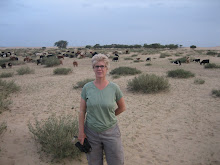
My dad has cancer. He told me last July at my sister's wedding in Georgia. We sat sideways on folding chairs, me in my borrowed blue dress, my chin on my hand on the back of the chair, Dad in his father-of-the-bride suit, his boutonniere beginning to droop in the afternoon sun. He has prostate cancer, stage 4. He outlined his treatment plan, which involved trips to Los Angeles to a cancer clinic called Compassionate Oncology. He was full of hope and good humor. So I was, too, that late summer afternoon.
It's half a year later. Dad has completed his chemo series and continues with hormone treatment and a cocktail of drugs. The cancer growths are smaller, his PSA count down to under 1%. This is good news. He has stents in his kidneys because the cancer was interfering with his kidney function. That is why he is in Los Angeles this week, to have the stents replaced (though the doctor had hoped to remove them). It is the reason I have driven 1,100 miles to be here with my dad. My brother, Greg, is here, as well. The three of us spent 13 hours on Tuesday at the hospital and the clinic. We enjoyed a long walk along Venice Beach in the California sun on Wednesday and then went our separate ways.
Cancer changes things. My dad, for one. He looks suddenly older; he's lost his hair and his always-slight frame is even more gaunt. My first thought when I picked him up at the airport was, "He looks like a cancer patient." Even though his progress has been good, it can't be easy to have to shift from a healthy, active lifestyle to having to depend on Depends and wearing those lovely medical support stockings. He bears it all with a tenacious good humor, though. Even when the pad the nurse had given him fell out through his pants leg onto the clinic floor, he didn't notice, much less mind. He reported to me and Greg, patting his wet crotch, "I had a pad, but I don't know where it went." Tuesday was a long but surprisingly entertaining day. Things are always entertaining with Dad around.
But how long will he be around? I see other changes in my Dad, as he comes face to face with his own mortality. I know he's not the first or the last to deal with this, nor am I alone in dealing with a dying parent. We're all dying, I know, but it's only theory until the diagnosis. The reality changes you. I notice that Dad
now has "firm beliefs" about the afterlife; that is new and perhaps inevitable, perhaps harmless. His opinions and judgments about things of this life seem harder, too, as if he needs to sort everything into a clear category, to organize life into a whole that he can understand and manage.
Perhaps none of my observations are valid and that is a caveat that must be clear. I cannot and do not speak for my dad or his experience. I am once removed from the disease, dealing with my own feelings of impending loss, even though I hope and even expect that that is years away. Most of us experience our parents' death while we live. I know I am not alone in this, nor am I even IN the experience yet. But I feel it coming. I am not sad, really, but it changes things, I can tell. As a child, I knew all of my great-grandparents; I have always felt secure in the generational line-up. When I lost three grandparents within a year and a half, things shifted. One generation at a time, I keep getting bumped up the line until there will be no one left between me and death.
I am not afraid of death. I am not worried about what happens next, though I've no clear information about it, just a deep knowledge that I am loved and known. But I can't pretend it doesn't change us, to come face to face with mortality, whether it's our own or that of someone we love. In the midst of life, it's easy to ignore death, even though we all know we'll all die.
Cancer stinks. It's a rotten disease and it touches most all of us. I admire my dad's good humor and optimism as he works to kill the cancer inside him. He's actually enjoying the ride, even as he faces life's toughest questions. I don't know how you could do better than that.
